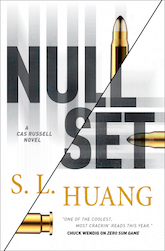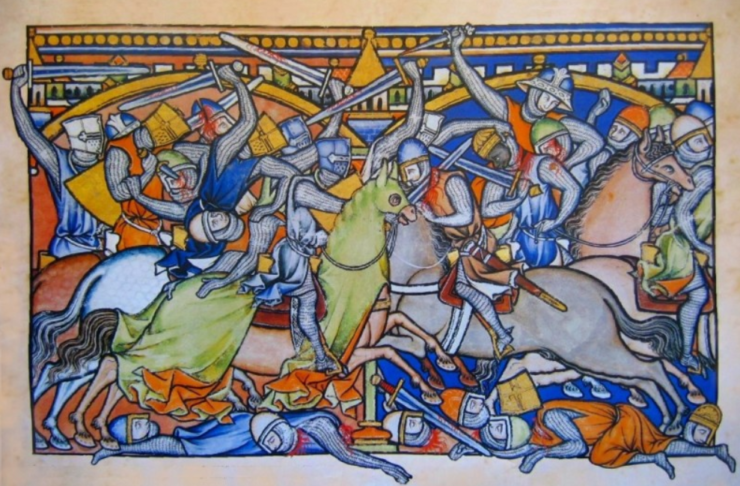A sword instructor of mine once asked: why do we romanticize swords?
He went on to point out that swords are the only class of weapons designed, solely and with no other purpose, for killing humans. Axes are used to cut wood, guns are used to hunt, knives have all manner of purposes. Sure, we have versions of these weapons that are meant to be more martial—combat knives versus kitchen knives, for example—but there are no kitchen swords. Historically, there was no other practical use for a sword besides killing a human being.
So why do we romanticize them?
I’m no less guilty of this fascination with swords. I’ve been training in them for more than a decade and a half now—if it has a blade, I’ve probably trained with it at some point. I love the feel of them and the grace of them. Their designs can be stunning. I enjoy feeling a connection to their history, and I’m fascinated to read about long-ago sword combat.
And, of course, I grew up on fantasy books filled with Magic Swords and Swords of Significance and Swords of Power. Knights and elves who were the best fencers in the kingdom, or pirates or duelists or Chosen Ones, or young girls who snuck away to become swordmasters even when they weren’t allowed. We permit swords to have a nobility in our fiction, an air of civilized elegance. Perhaps because we associate them with systems of chivalry and honor. Or perhaps because we are far removed enough from their historical violence that we feel more comfortable assigning them a more positive character than other weapons. It’s a question I’ve mulled over and have no good answer for. In the end, I’ve come to accept the cognitive dissonance of loving swords while having more complicated feelings about their original purpose.
But as writers and readers of sword and sorcery, I think it does make stories better—if perhaps less simple—to keep that purpose never far from mind.
Writer friends not infrequently ask me to critique their sword scenes. One of the most common points I give feedback on is that they’re not treating the swords as dangerous enough. Sure, when I train, sometimes we’re lackadaisical with our sword safety, but we’re using blunted weapons. I often get asked by people with wide eyes if we’re using “real swords”, even after they’ve seen us with their own eyes… and, well, yes, they’re real! If you get hit in the head with three feet of carbon steel it’s going to hurt! But they’re not sharp. However, once one of my instructors had a beautiful, actual sharp sword custom-made for himself. When he brought it into class, the difference was marked.
We all handled it—and this was a sword class, so we all handled swords regularly—but this one sucked all the air out of the room. Its sharpness, its danger, made the whole atmosphere suddenly heightened. People walked in parabolas around it, as if it were creating its own gravity well. The razor fineness of its edges seemed enough to part flesh from several feet away.
Buy the Book


Null Set
People seem to understand this more viscerally with knives, especially if they’ve handled extraordinarily sharp kitchen knives. Indeed, in combat knives are extremely dangerous weapons to fight with. There’s an exercise you can do to show this—put chalk on two rubber practice knives and tell people to try sparring with them. Both people inevitably get covered in chalk. It’s near impossible to walk away from a knife fight without getting cut. And I think most people can better imagine the awful, charged fear that would come with someone drawing a knife on them, the break in civility and safety.
Swords are many, many times longer than a knife.
There is some SFF that addresses all this very well. For example, though I could quibble about other sword bits in George R.R. Martin’s A Song of Ice and Fire, one scene I feel he gets viscerally right is the first time Arya kills someone. All she can remember is to “stick them with the pointy end”—and she does. And he dies. Because that’s what swords do. The flashiness or balletic technique are all, ostensibly, to drill down to that final, fatal goal.
Fiction might always have exceptions to such a rule, of course, such as in the delightful Inigo / Westley dance in The Princess Bride, which makes a point of the duelists’ fantastical expertise by the way they’re able to toy with each other. But I would argue that such a scene’s charming ridiculousness becomes weakened if we don’t keep in mind its contrast to reality. So, too, do the weapons themselves become less impressive or full of import when characters don’t react to their capabilities. For example, the duels in the original Star Wars trilogy are magnificent—the work of the late great Bob Anderson, who was also the sword master for The Princess Bride—but in the first scene we see with a lightsaber, I can’t help but be astonished by how Obi-Wan hands Luke what is essentially a loaded gun without a word of caution or warning, and Luke turns it on while pointing shockingly close to where his mentor is standing. Lightsabers are depicted as being able to cut through anything, but Obi-Wan takes nary a step back. I can only excuse that scene by imagining he must be using the Force to ensure everyone’s safety! The break in realism stymies me, but more than that, I find myself perturbed at how it dilutes the intrinsic danger of such an intimidating weapon.
Give me my swords in all their formidable, unsafe, threatening lethality. Retain their power until I am uncomfortable with their beauty.
I’m certainly not calling for raining down judgment on swords or the people who love them. After all, I am the first among us who throws myself enthusiastically into their complicated romance. But for me, part of nerding out about being a sword geek is remembering what they are—weapons. And challenging myself not to forget that, no matter how much excitement, artistry, or character I find in them in the present day.
S. L. Huang has a math degree from MIT and is a professional stuntwoman & armorer who has worked in Hollywood on Battlestar Galactica and a number of other productions. Her short fiction has appeared in Strange Horizons, Nature, and The Best American Science Fiction & Fantasy 2016. She is the author of the Cas Russell series, which includes Zero Sum Game and Null Set.










